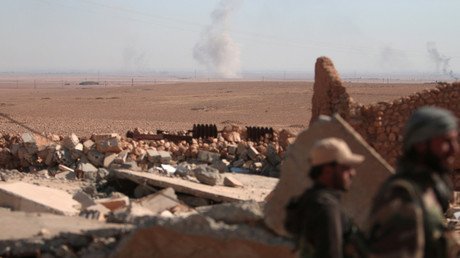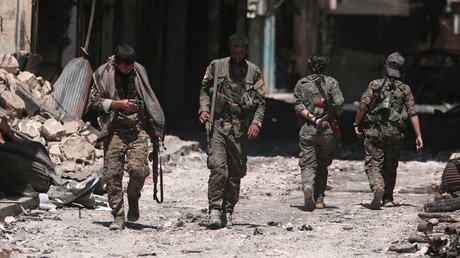Raqqa rift: State Dept says US leaves once ISIS ousted, military plan to hold & govern city
US officials are split over the future of Raqqa, Syria, with some claiming all international forces will leave the city once it is freed from terrorists, and others announcing plans to stay to ‘govern’ it along with Turkey.
As Syrian Kurdish and Arab fighters, backed by US advisers and coalition airstrikes, slowly advance on the Islamic State (IS, formerly ISIS/ISIL) stronghold of Raqqa, US officials have been voicing their opinions on what will happen to Raqqa once it is liberated. The US State Department says that after the terrorists are defeated, all foreign forces will leave the city to let the Syrians run it.
“How the liberation takes place, how we get local governance re-established after the liberation: our expectation, as has been elsewhere, is that outside forces would then withdraw,” US State Department spokesman Mark Toner said in a daily press briefing on Monday. He then clarified that US forces will supervise the re-establishment of local authority in the city, but other than that will not intervene in its governance.
“We don’t want to see semi-autonomous zones. The reality is, though, as territory is liberated from [Islamic State], you’ve got to get some kind of governance back into these areas, but by no means are we condoning… any kind of semi-autonomous areas in northern Syria.
“Ultimately, we want to see a sovereign, intact Syria,” Toner stressed.
The US military's position, however, differs slightly from that of the State Department.
“The coalition and Turkey will work together on the long-term plan for seizing, holding and governing Raqqa,” US General Joseph Dunford, chairman of the Joint Chiefs of Staff said on Sunday, following a meeting with his Turkish counterpart General Hulusi Akar in Ankara.
He went further, saying that taking and holding Raqqa requires a “predominantly Arab and Sunni Arab force.”
“And there are forces like that. There is the moderate Syrian opposition, the vetted Syrian forces and the Free Syrian Army forces, and there is some initial outreach to forces in Raqqa proper,” the general added.
Syrian political analyst, Taleb Ibrahim, called these statements “a language for war,” and said the US has no right to impose any governance in Syria given the fact that it is an independent state which has a government, while the United States have never even received permission from Syrian authorities to participate in the conflict on Syrian land.
“I don’t think this is an appropriate language and it indeed is not the language of peace. It is not a language of political resolution, it is not a language for reconciliation – it is a language for war, it is a language for making new maps [in] the Middle East which were called in the past time the maps of blood,” Ibrahim said.
“This indicates a very dangerous concept and I am very much concerned about the future of Syria… They are intervening illegally in an independent state which has a government, an elected president and a real authority on the ground. But [the US uses Islamic State] as justification to occupy large areas of Syria for their geopolitical goals,” he noted.
Dr. Max Abrahms, assistant professor of public policy in the department of political science at Northeastern University, said the US is counting their chickens before they are hatched, deciding the fate of Raqqa at this stage.
“It’s almost premature to talk about governance. This Raqqa mission is going to take a long time,” Abrahms told RT.
The Syria Democratic Forces, or SDF, an alliance of predominantly Kurdish fighters and Arab tribal militia, is currently advancing on Raqqa. While the US has been supporting the SDF with weapons and airstrikes, General Dunford said he does not see the group as capable of governing Raqqa after the fighting is over.
“We always knew the SDF wasn’t the solution for holding and governing Raqqa. What we are working on right now is to find the right mix of forces for the operation.” He added that in deciding what these “right forces” are, the US military will rely on none other than Turkey.
“They will be helpful in identifying the right forces to do that,” he said.
Turkey, meanwhile, has been vocally opposing the SDF, or rather the dominant part of it – the YPG militia – from being the leading force in the Raqqa operation. Ankara sees the group as an extension of the outlawed Kurdistan Workers Party (PKK) and is worried that Kurdish advances in Syria will inflame a three-decade-old Kurdish insurgency in Turkey and lead to the establishment of a Kurdish state.
Turkish General Akar once again told Dunford on Sunday of Turkey’s frustration at the presence of Kurdish forces in Manbij, a strategically important northern Syrian city, whose liberation prompted Turkish intervention, as it is close to the Turkish border. Earlier this Tuesday, alluding to the YPG, Turkish Foreign Minister Mevlut Cavusoglu said Ankara wants to ensure that the “wrong groups” do not participate in the Raqqa operation, and most importantly do not enter the city, although they may take part in the siege. He warned that Turkey was “taking measures” to guarantee this outcome, but did not specify what measures exactly, Reuters reported.
The Kurds themselves have been calling Turkey an “obstacle” to the attack on Raqqa all along, with SDF official Rezan Hiddo warning the group would halt the advance on Raqqa if Turkish forces moved against the Kurds in northern Syria, which even the US State Department sees as possible.
“Any attempt by Turkey to make an aggression against Manbij will certainly impede liberation of Raqqa and we will not remain silent. Our priority is confronting Turkey's aggression against Manbij. The ball is now in the coalition's court and its seriousness will be shown in forcing the Turks to withdraw from the region,” Hiddo was quoted as saying by Fars News Agency.
The US State Department says that in this “complicated climate,” the US will try and “keep pressure on what is the common enemy here, which is [Islamic State],” but Max Abrahms believes it is not likely they will succeed.
“I think that the US is really just trying to placate Turkey [but] I think that there’s a real concern that Turkey is going to go on the offensive even more on Kurdish fighters,” he stated.
The SDF has meanwhile moved south towards the city despite fierce resistance from IS militants. Alliance forces captured at least 10 villages and advanced on two fronts, including at least 10 kilometers (six miles) south towards the city from the towns of Ein Issa and Suluk, SDF spokeswoman Jihan Sheikh Ahmed told AFP on Tuesday.
In both locations, the SDF is still some distance away from Raqqa, but the offensive is said to be going according to plan. The SDF says it has some 30,000 fighters taking part in the operation dubbed “Wrath of Euphrates,” aiming to surround and isolate terrorists inside Raqqa before launching an assault on the city itself. The US-led coalition said it carried out 16 airstrikes on Islamic State positions on Sunday, hitting the group’s tactical units and several car bombs near Ein Issa.














